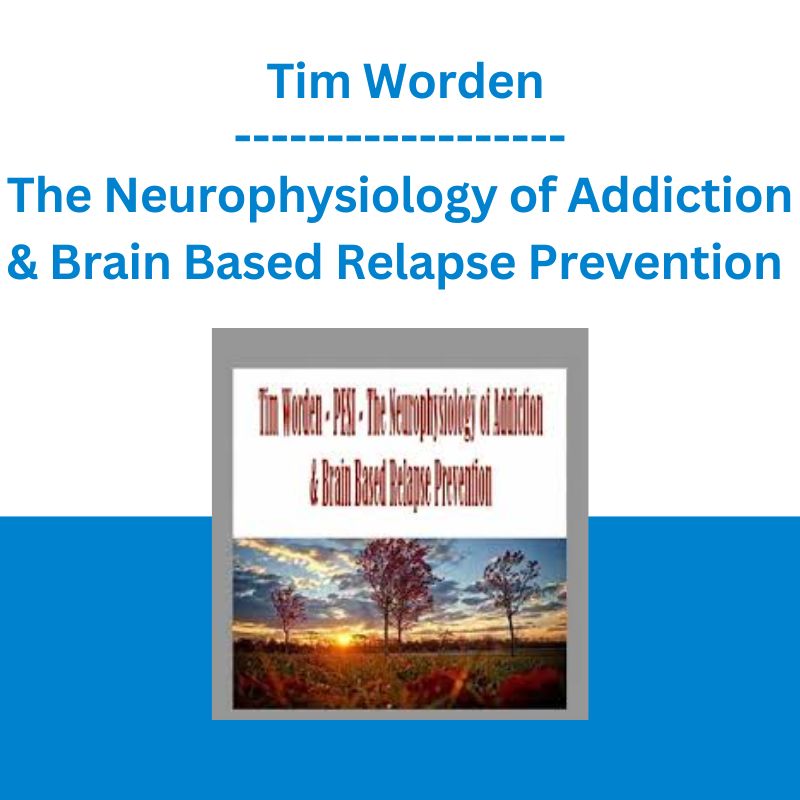*** Proof of Product ***
Exploring the Essential Features of “The Neurophysiology of Addiction & Brain Based Relapse Prevention – Tim Worden”
- Guide your treatment strategies through an understanding of the neurological changes caused by addiction
- Structure a comprehensive treatment approach by understanding the five brain-based tasks of recovery
- Effectively assess relapse potential
- Take home a relapse prevention plan, based on neuroscience which will integrate seamlessly into your sessions regardless of your psychotherapeutic approach
Working with clients whose progress is continually hindered by ongoing addiction is frustrating. No matter the progress, the issues of relapse appear and despite your best techniques, the client continues to flounder in therapy.
Join addictions expert Dr. Tim Worden, to put these frustrations behind you – and see improved treatment outcomes. Tim will give you easy-to-understand language to use in explaining the neurophysiology of addiction to the client. Armed with a better understanding, your clients will become more open to an approach that guides the individual through a blending of psychotherapy with an innovative relapse prevention plan – one that you’ll know exactly how to formulate after attending this seminar.
Regardless of your psychotherapeutic approach, this approach can be assimilated into your sessions easily. Tools and worksheets designed for relapse planning and the best strategies to apply case-by-case for co-occurring disorders such as trauma, anxiety and depression will be yours by the end of day. Any mental health professional, not just those trained in addiction counseling, will take home new skills and confidence to succeed.
Speaker
Tim Worden, Ph.D.
Executive Director and Clinical Psychologist
Futures Wellness & Recovery
Dr. Tim Worden, Ph.D. the founding executive director and consultant of Futures Wellness & Recovery Center in Tequesta, Florida is a licensed clinical psychologist and Neuropsychologist, currently in private practice specializing in addictions and health psychology in the Los Angeles area. He received his doctorate from the University of South Florida over 25 years ago. His work in substance abuse includes inpatient (Palo Alto VA), outpatient (Linn County Drug & Alcohol Program), and several residential treatment centers as a staff psychologist, including clinical director positions at New Seasons Recovery and Summit Malibu. He has been a visiting assistant professor in the Department of Clinical Psychology at the University of Florida focusing on pain management and neuropsychology, as well as the clinical director of a neuro-rehabilitation program where he functioned as a neuropsychologist and rehabilitation psychologist for 10 years.
During this time he developed his unique psychotherapeutic approach called Neuro-Emotional Therapy (NET), which emphasizes the neurologically based emotional-motivational factors involved in change. He has dove-tailed this therapeutic approach with advanced training in Emotionally Focused Therapy (EFT) and Dialectical Behavior Therapy (DBT), which emphasize emotional regulation. He has co-authored several articles on anger, anxiety and health, and has developed the Life Satisfaction Questionnaire, the Human-Styles Questionnaire, the Values Clarification Inventory, and co-authored the Work Attitudes Inventory, which focuses on Integrity in the Workplace. He is completing books on eliminating guilt and shame, relapse prevention: a motivational approach, and life satisfaction.
Speaker Disclosure:
Financial: Tim Worden maintains a private practice. He is the Executive Director for Worden Aftercare. Dr. Worden receives a speaking honorarium from PESI, Inc. He has no relevant financial relationships with ineligible organizations.
Non-financial: Tim Worden has no relevant non-financial relationship to disclose.
Target Audience
Psychologists, Counselors, Social Workers, Addiction Counselors, Marriage & Family Therapists, Nurses, and other Mental Health Professionals
Objectives
- Explain to clients the fundamental brain changes that occur with addiction.
- Develop a treatment approach that addresses the five fundamental tasks of recovery.
- Practice a comprehensive systematic relapse prevention plan.
- Implement the four essential strategies in the relapse prevention plan.
- Utilize cognitive and experiential techniques to increase the client’s motivation to prevent relapse.
- Identify clients who are likely to relapse from those that are not likely to relapse.
Outline
The Neurophysiology of Addiction
- The continuum of abuse to dependence
- Normal neuro-transmission
- The neurophysiology of dependence
- Addiction’s influence on co-occurring disorders such as depression and anxiety
The Neurophysiology of Motivation and Desire
- Addiction’s hijacking of the reward and motivational system
- The relationship between emotional dysregulation and relapse
- The relationship between the frontal lobes, motivation and relapse
The Five Tasks of Recovery
- Core emotional issues such as depression and anxiety that are driving the addiction
- Strategies for day-to-day emotional regulation
- Relapse prevention
- Changing the Motivational System: Life satisfaction and dopamine
- Structuring ongoing recovery support
Relapse Prevention From a Brain Perspective
- Dopamine–driven triggers for relapse
- Cognitive, behavioral, and emotional relapse prevention strategies
- Motivational coping: the essence of a brain-based relapse prevention plan
- Practice the feeling of not wanting to relapse
The Elements to Long-Term Relapse Prevention
- Effectively assess relapse potential
- Prepare for the dopamine spikes
- Train the family/support system
- Identity as a non-user without loss
- The Life Plan: long-term life satisfaction free of addiction
Please see the full list of alternative group-buy courses available here: https://lunacourse.com/shop/










 Spidey - Induction
Spidey - Induction  Crypto Dan - The Crypto Investing Blueprint To Financial Freedom By 2025
Crypto Dan - The Crypto Investing Blueprint To Financial Freedom By 2025  Money Miracle - George Angell - Use Other Peoples Money To Make You Rich
Money Miracle - George Angell - Use Other Peoples Money To Make You Rich